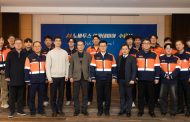On June 10, UNIST signed a strategic partnership agreement with Microsoft Korea at the university’s Main Administration Building. The partnership aims to actively incorporate AI technologies into practical applications and to advance university-specific digital transformation initiatives.
The signing ceremony was attended by Vice President Sung Chul Bae of Academic Affairs, Director Jae Joon Kim of Academic Information, Team Leader Jong Hee Lim of the IT Strategy Team, along with representatives from Microsoft Korea. This collaboration represents a significant step forward in UNIST’s commitment to pioneering innovative digital solutions and fostering an environment of advanced AI research and application.
As part of this partnership, UNIST will deploy Microsoft 365 Copilot, providing faculty and staff with the opportunity to experience and utilize generative AI within Office applications like Excel, Word, and PowerPoint. This integration is expected to greatly improve work efficiency across the university.
In addition, UNIST will develop its own AI platform by integrating Microsoft’s Azure AI Foundry — a pioneering effort among Korean universities. By leveraging Azure AI Foundry, UNIST will have access to cutting-edge large language models (LLMs), such as GPT-4, Llama, and Mistral, enabling the deployment of AI services tailored specifically to its educational environment.
Microsoft Korea will support the initiative by providing AI experiential booths and hosting prompt competitions to promote a culture of AI adoption. These initiatives are designed to enhance user engagement and support a user-centered approach to digital transformation.
The partnership is also expected to significantly boost digital literacy among UNIST community members. Participants will learn the fundamental principles and practical applications of generative AI, exploring ways to incorporate these technologies into teaching and research.
Vice President Bae stated, “By providing access to Microsoft 365 Copilot and developing our own AI platform, we aim to create customized AI assistants and chatbots for our community.” He further noted, “We plan to pilot these solutions in the second half of this year to establish a standalone AI ecosystem unique to UNIST.”







![[2026 Matriculation] UNIST Welcomes Class of 2030!](https://news.unist.ac.kr/wp-content/uploads/2026/02/사진-박종래-UNIST-총장이-2026년-입학식사를-전하고-있다-2-190x122.jpg)
![[2026 UNIST Commencement] UNIST Confers Degrees to 883 Graduates](https://news.unist.ac.kr/wp-content/uploads/2026/02/사진-2026학년도-UNIST-졸업생들이-학사모를-위로-던지며-졸업을-축하하고-있다-1-800x413-190x122.jpg)



